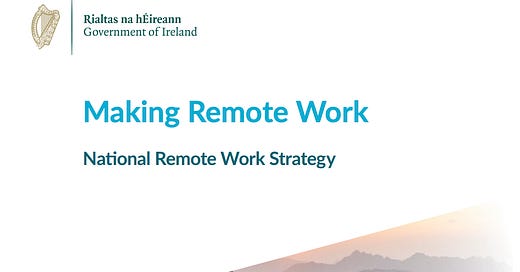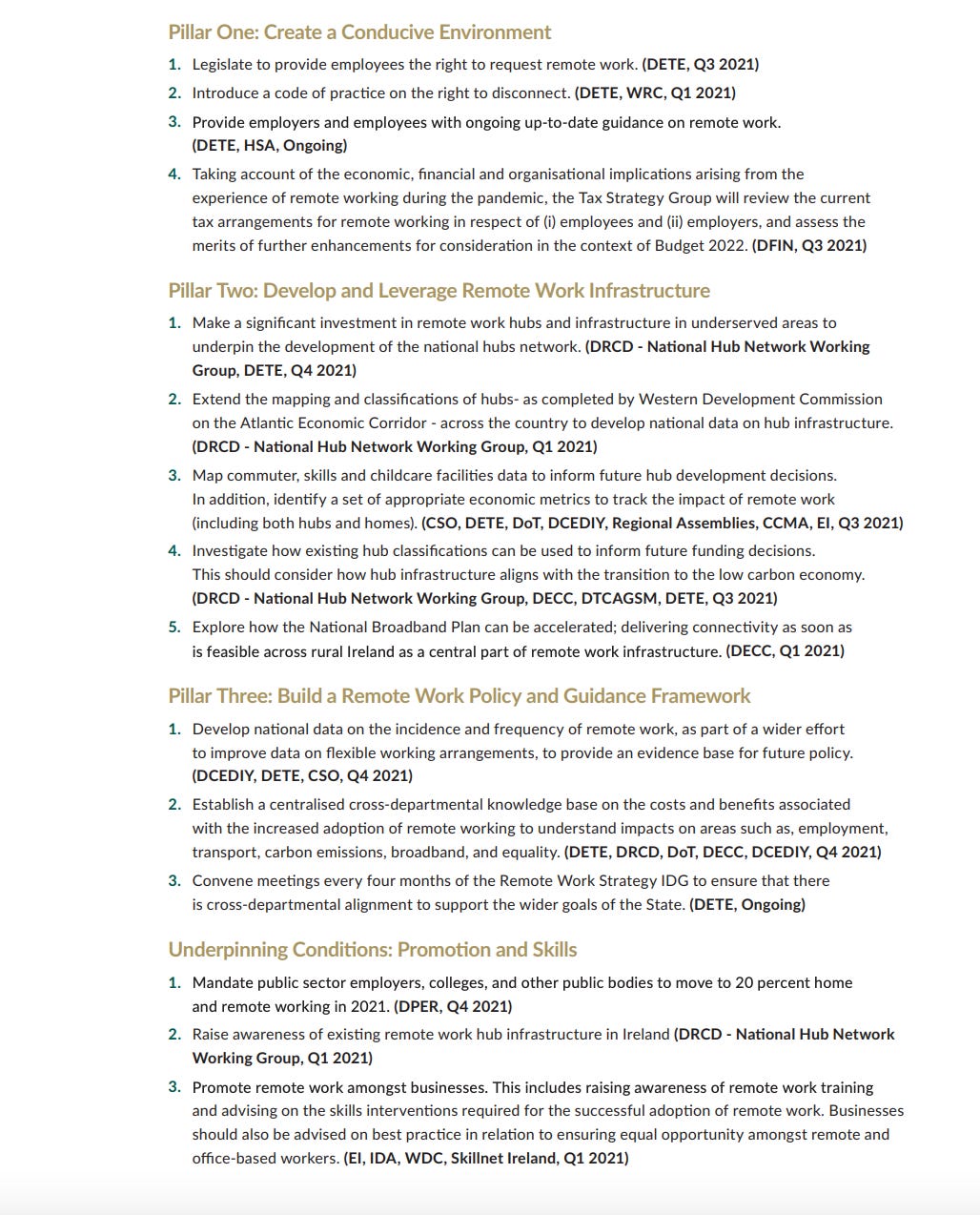Ireland's National Remote Work Strategy Is Fantastic
It's cogent, prescriptive, and cares about people
I fancy myself a political centrist in that I value politics (and policy) that is pragmatic and takes into account how things actually work, not just the rhetoric of it all. And so naturally I was skeptical when I first saw Ireland’s “National Remote Work Strategy.” The semi-kitschy name (“Making Remote Work”) got a hearty chortle out of me, but then it was down to business. I admit thinking no national government could come with that level of pun and still have good policy. Boy, was I wrong.
The policy is downright fantastic. Here’s what I love about it.
Starting with data
Ireland first did a national remote work survey in May 2020. A whopping 84% of people said they want the option to work remotely post-pandemic. They redid the survey in October 2020 - and 94% of people said they wanted remote work options post-pandemic.
A similar survey happened of the Irish public service employees in July 2020. 86% said they wanted remote work post-pandemic.
I highlight these stats not to share how many people wanted it (which is obvious), but to say I like that Ireland started by asking people what they wanted.
Clear outcome focus
The report begins with the minister’s letter. Leo Varadkar TD is the Tánaiste and Minister for Enterprise, Trade and Employment in Ireland. In the letter, Minister Varadkar says that the strategy is meant to: help rural Ireland flourish, explicitly not turn everyone’s homes into offices, keep jobs in Ireland, and ensure city centres remain vibrant.
First off: I like these goals. They are balanced and already indicate that the Irish government paid attention to people’s and business’ concerns (more on that below).
But also I like how they explicitly call out the benefits they hope to see from remote work: good work life balance for employees, reducing carbon emitted via transportation, and improving child and family wellbeing.
With all those outcomes in mind, they can get down to policy. But I love that it starts with tangible outcomes. The kind you know when you see, but may be hard to measure objectively. Instead, leave the measurement to policy (more on that below, too).
Leading by example
Unlike marketing style strategies that try to get you to do something, Ireland’s strategy is very much a “we.”
The country has committed in the strategy to leading by example, making at least 20% of public service jobs remote. That may be higher, given that 86% of people want flexibility. But one of the policies in the strategy is an employee’s right to request remote work, so it’s good that the government is doing it as well. Otherwise, this well-meaning law could be perceived as nothing more than forcing businesses to do what the government won’t.
I also like that the strategy includes laws around the right to disconnect - a clear tie to the work life balance and family outcomes.
Acknowledging concerns
No strategy can be taken seriously that doesn’t assess the pitfalls. Ireland didn’t shy away from them, and I really appreciate that (particularly in a world where some remote work advocates on Twitter only talk about the benefits of remote work and call you stupid or backward if you don’t agree).
The concerns highlighted in the report are:
Remote work pushing jobs abroad
Reduce city vibrancy if people leave en masse
Reduce visibility of workers - opening up more opportunities for discrimination in employment
Innovation deficit because of collaboration issues
Reduction in collegiality and shared ownership mentality among employees
Falling back in terms of making old buildings more accessible if companies assume people with disabilities will only ever work remotely
So I like that Ireland named concerns. That’s one thing. But let’s take stock of the types of concerns raised, cause they are great.
Not only is it clear that there are government issues (jobs going abroad), but also employee issues (discrimination) and company issues (innovation deficit and lower ownership mentality among employees).
Remote work is a fundamental shift to how we operate our professional lives, and I am grateful Ireland acknowledged not just the gravity of the situation but also talked to all stakeholders involved - or at least took into account issues faced by all stakeholders.
Resources on day one
The thing I hate most about a LOT of remote work content is that it’s mostly hoopla. Remote work will free everything! Yay! Ok, now what?
WELL, the Irish have an answer for that, too.
Not only are there clear policies (see below!), but they provided resources anyone can use RIGHT NOW.
Here are my three favourites:
Clear policy prescriptions
I love a good clear policy prescription, and Ireland delivered. Their strategy has three pillars to it:
1 - Build a conducive environment for remote (work hubs and informational guides for employees and employers)
2 - Building remote work infrastructure (work hubs, broadband)
3 - Using remote work to achieve public policy goals outside of the strategy (around employment, data collection, etc.)
I included a screenshot below of the policy prescriptions - you have to read them. They are an inspiration.
But I’ll highlight one that I think is great: Tax incentives.
In the new budget 2021, employers can give 3.20 euros per day, tax free, to employees as a form of stipend for working from home. This can be used for heat, internet, electricity, or other infrastructural things that an office would typically take care of.
If employers don’t offer this incentive, then citizens can claim 3.20 euros per day as a tax credit when filing their taxes.
I love this in particular because it’s simple. If a business can afford to give the stipend, awesome. If not, then employees don’t lose out - they get a tax credit at the end of the day. Yet another example of Ireland considering all parties involved instead of only promoting the rhetoric of remote work or talking about benefits in the abstract.
These policy prescriptions though!!! I had to just screen shot it so you could read it all for yourself.
When I first wrote about what governments needed to do to attract remote workers, it was in the middle of the first wave. A lot has changed, politically and otherwise, around the world since then. But it seems Ireland picked up on the key elements that remote workers actually want and need: internet, legitimate changes to tax laws, and a recognition that remote work is not an anti-city movement, but indeed a movement to let people live wherever they want to.
I think the government is right to be concerned about jobs leaving Ireland, but at the same time I think it underestimates the position it’s in. An English-speaking European Union country with lush greenery, ocean views, vibrant modern cities, and historical old town centres. It really does have a bit of everything (and property is cheaper than in many other places). Not to mention its convenient geography. You can be in New York City or Toronto in 5 hours - to say nothing of the 25 min hopper flight to London or the 45 min hopper to Paris or Amsterdam.
Just call it the luck of the Irish, I suppose…
Thanks for reading!
☕ If you enjoy what I do, buy me a virtual coffee from time-to-time to support my work. I know it seems small, but it truly helps.
👉 Was this email forwarded to you? Subscribe now to receive the next one. You can also help grow the newsletter by asking a like-minded friend to sign up.
💌 Feedback to share or want to say hello? Hit reply on this email or leave me a comment on Substack.





